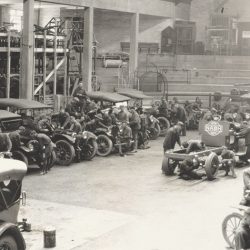Rough Landing
After the quake, student group returns safely from Haiti.

Tyler Lark x’10 (left) of Engineers Without Borders helps two Haitians repair a water pipeline in the village of Bayonnais. Photo: Randi Schieber
When the students in the UW service group Engineers Without Borders (EWB) left for a brief trip to Haiti over winter break, they knew that they were going to the poorest nation in the Western Hemisphere. But they didn’t know how bad conditions there would become.
On January 12, three days after the group arrived in Haiti, its capital, Port-au-Prince, was rocked by a massive earthquake. An estimated 170,000 Haitians were killed, and hundreds of thousands more were left homeless.
The UW students, however, were situated in the village of Bayonnais, about seventy miles from Port-au-Prince, and were unharmed. That day they sent a message confirming their safety.
“We are ok!” Eyleen Chou x’10, one of the team members, posted on the EWB blog, noting that the quake “was a mere tremor here.”
EWB’s mission is to send engineering students to developing communities around the world to aid with construction projects. (See “Down from the Mountain” in the Fall 2005 issue for more.) It has been working in Bayonnais for three years, attempting to improve the village’s water supply.
The buildings in Bayonnais did not suffer any structural damage, and the students were in no immediate danger. After repairing a pipeline, they returned to the United States as originally scheduled on January 15.
“Basically, it came down to a decision as to what was more burdensome [to the Haitians],” says Chou. “If we stayed, we would just have been more mouths to feed, and supplies there were already diminishing.”
The Bayonnais project is scheduled to run at least five years, and EWB had intended to return in March. Chou notes that those plans are now uncertain, though she hopes to return to Haiti soon.
“After talking with other [EWB] members,” she says, “we feel even more that we want to help.”
Published in the Spring 2010 issue



Comments
No comments posted yet.